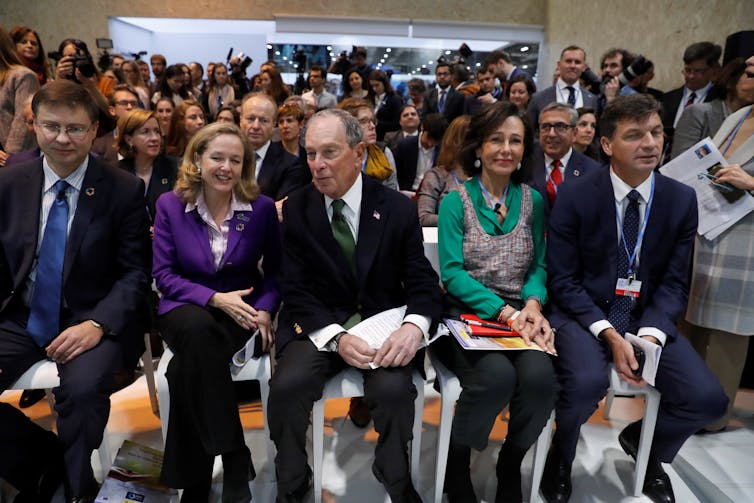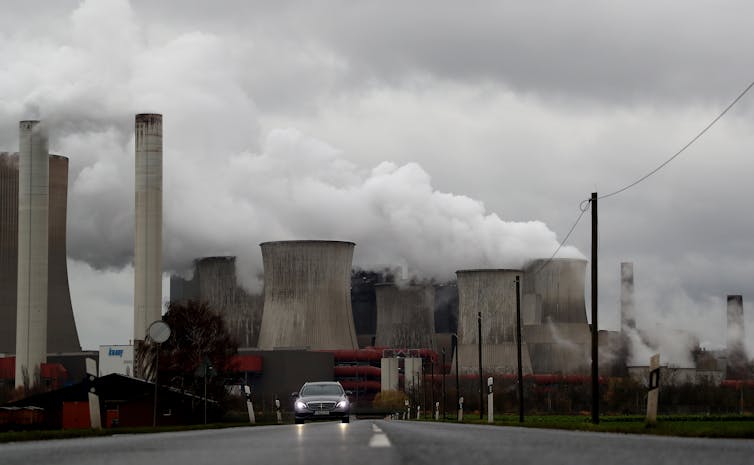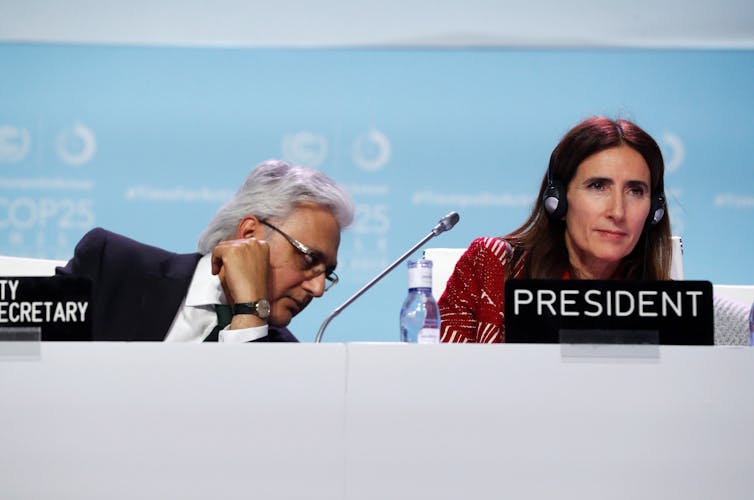The Madrid climate talks failed spectacularly. Here's what went down
- Written by Kate Dooley, Research Fellow, Climate and Energy College, University of Melbourne
The United Nations’ COP25 climate talks concluded on Sunday morning in Madrid, almost 40 hours overtime. After two weeks of protracted talks meant to address the planetary warming emergency, world leaders spectacularly failed to reach any real outcomes.
The degree to which wealthy nations, including Australia, blocked progress on critical points of debate incensed both observers and country delegates.
These points included robust rules for the global trading of carbon credits, increased commitments for finance to help developing nations tackle climate change, and most importantly, raising ambition to a level consistent with averting catastrophic climate impacts.
 Australia’s Emissions Reduction Minister Angus Taylor, far left, with other delegates to the COP 25.
JUAN CARLOS HIDALGO
Australia’s Emissions Reduction Minister Angus Taylor, far left, with other delegates to the COP 25.
JUAN CARLOS HIDALGO
High hopes
COP25 was a conference of “parties”, or nations, signed up to the Paris Agreement, which takes effect in 2021. I attended the conference as an observer.
Emissions reduction targets of nations signed up to Paris put Earth on track for a 3.2℃ temperature increase this century. However the Intergovernmental Panel on Climate Change says warming must be kept below 1.5℃ to avoid the most devastating climate impacts.
Much was riding on the outcome in Madrid. However, it failed to deliver.
Read more: Earth has a couple more chances to avoid catastrophic climate change. This week is one of them
One of the key agenda items was Article 6 of the Paris Agreement, involving international carbon trading between nations.
The previous COP in Poland failed to reach consensus on these trading rules, and after this latest meeting, many contentious issues remained unresolved. These include:
how to ensure that an overall reduction in global emissions is achieved and that the rules prevent double counting (or emissions reduction units being counted by both the buying and selling nation)
whether a levy would be applied to proceeds from carbon trading to finance adaptation in developing nations
the recognition of human and indigenous peoples’ rights, and social and environmental safeguards, given the harms caused by previous carbon trading mechanisms
critically for Australia, whether countries could use “carryover” carbon credits from the Kyoto Protocol to meet commitments under the Paris Agreement.
 An indigenous woman from Amazon reacts during COP25, which largely failed to deliver.
JUAN CARLOS HIDALGO/EPA
An indigenous woman from Amazon reacts during COP25, which largely failed to deliver.
JUAN CARLOS HIDALGO/EPA
The question of Kyoto credits
Australia was pushing to allow use of Kyoto Protocol units, for which it drew scathing criticism from other nations, international media and observers. It plans to meet more than half its Paris target via this accounting loophole.
Brazil, India, South Korea and China also want to carry over credits earned under the Clean Development Mechanism, a trading scheme under Kyoto.
Read more: Now Australian cities are choking on smoke, will we finally talk about climate change?
No consensus was reached. The negotiations for rules for carbon markets will now continue at COP26 in Glasgow next year, just weeks out from the Paris Agreement’s start date.
The argument will not be easily resolved. Five of the last seven COP meetings failed to reach a decision on carbon market rules, indicating the extent of international divisions, and calling into question the disproportionate focus on carbon trading, given its limited ability to address climate change.
In Madrid, 31 nations signed up to the San Jose principles, seeking to ensure environmental integrity in carbon markets. Upholding these principles would mean emissions must go down, not up as a result of trading carbon.
 Steam rises a German coal-fired power plant. The COP25 failed to make progress on cutting emissions from coal and other sources.
EPA/FRIEDEMANN VOGEL
Steam rises a German coal-fired power plant. The COP25 failed to make progress on cutting emissions from coal and other sources.
EPA/FRIEDEMANN VOGEL
Other failures
The conference also discussed measures to strengthen the governance and finance arrangements of the Warsaw International Mechanism, a measure designed to compensate poor nations for climate damage.
Little progress was made on mobilising finance from developed nations. The US, which will soon exit the Paris Agreement, played a key role in stymieing progress. It resisted efforts for broad governance arrangements, and pushed for language in the rulebook which would exclude high-emittiong nations from liability for the loss and damage experienced by vulnerable countries under climate change.
Read more: Global emissions to hit 36.8 billion tonnes, beating last year's record high
At Glasgow, all nations under Paris are required to submit new emissions reduction commitments. It was widely expected that the Madrid meeting would strongly urge nations to ensure these targets were more ambitious than the last. Instead, the final text only “reminds” parties to “communicate” their commitments in 2020.
 President of COP25, Carolina Schmidt (right), and UN official Ovais Sarmad.
EPA/MAST IRHAM
President of COP25, Carolina Schmidt (right), and UN official Ovais Sarmad.
EPA/MAST IRHAM
‘Crime against humanity’
When the COP finally closed on Sunday morning, the meeting had failed to reach consensus on increasing emissions reduction ambition to the level required.
The results are disheartening. The world has let another chance slip by to tackle the climate crisis, and time is fast running out.
The implications of this were perhaps summed up best by the low-lying Pacific island state of Tuvalu, whose representative Ian Fry said of the outcome:
There are millions of people all around the world who are already suffering from the impacts of climate change. Denying this fact could be interpreted by some to be a crime against humanity.
Authors: Kate Dooley, Research Fellow, Climate and Energy College, University of Melbourne
Read more http://theconversation.com/the-madrid-climate-talks-failed-spectacularly-heres-what-went-down-128921





